Biniam Girmay’s emergence as one of the leading lights of 2022, following his victories in Gent-Wevelgem and stage 10 of the Giro d’Italia, may have been a moment of great change in the world of cycling.
The Eritrean’s breakthrough felt so significant because of how notoriously difficult the journey is for most African riders to make it as professionals. In the coming years, many more may follow in his pedal strokes and transform the cycling landscape.
“As hard as it is with men, make it times ten for the women.”
That’s what Kimberly Coats, CEO of African cycling development organisation Team Africa Rising, told Cyclingnews of the prospects for female African riders going professional in Europe.
That’s why it’s remarkable to see an all-time high of 16 female Africans from seven different nations racing for UCI teams in 2023.
Most African riders, whatever their gender, face the challenges of travel restrictions, lack of access to quality equipment and a scarcity of high-standard races to compete in.
South African Hayley Preen, racing for Torelli in 2023, nearly had her successful 2022 derailed by visa issues. She believes the travel restrictions ultimately cost her a move to a bigger team for this season.
“I could only go to Europe for two months because of visa issues. That’s one of the main things that stopped me from getting into a bigger team for this year, just because I only have a South African passport,” Preen told Cyclingnews.
Team Africa Rising (opens in new tab) runs programmes in several African nations aiming to empower women and men to reach their potential on the bike. Through this work, Coats has seen a unique barrier to entry to the sport for women due to cultural expectations put on them in many African communities to marry and have children – forgoing any other aspirations.
“We have been trying to get them to see that they can be an athlete and be married and have kids. They can have it all. They don’t even think it’s possible, they think it’s an either-or situation,” Coats said.
This worldview is deeply ingrained. It’s part of the cultural framework in many African nations, and although change is occurring in some communities, it’s a long road.
“Culture is important. If you step outside that culture by saying ‘hey, I’m going to be a professional female cyclist,’ that’s difficult for some people to handle,” Coats said.
It would be wrong to make any blanket cultural statements about Africa as a whole. Algerian culture…
Click Here to Read the Full Original Article at CyclingNews RSS Feed…

